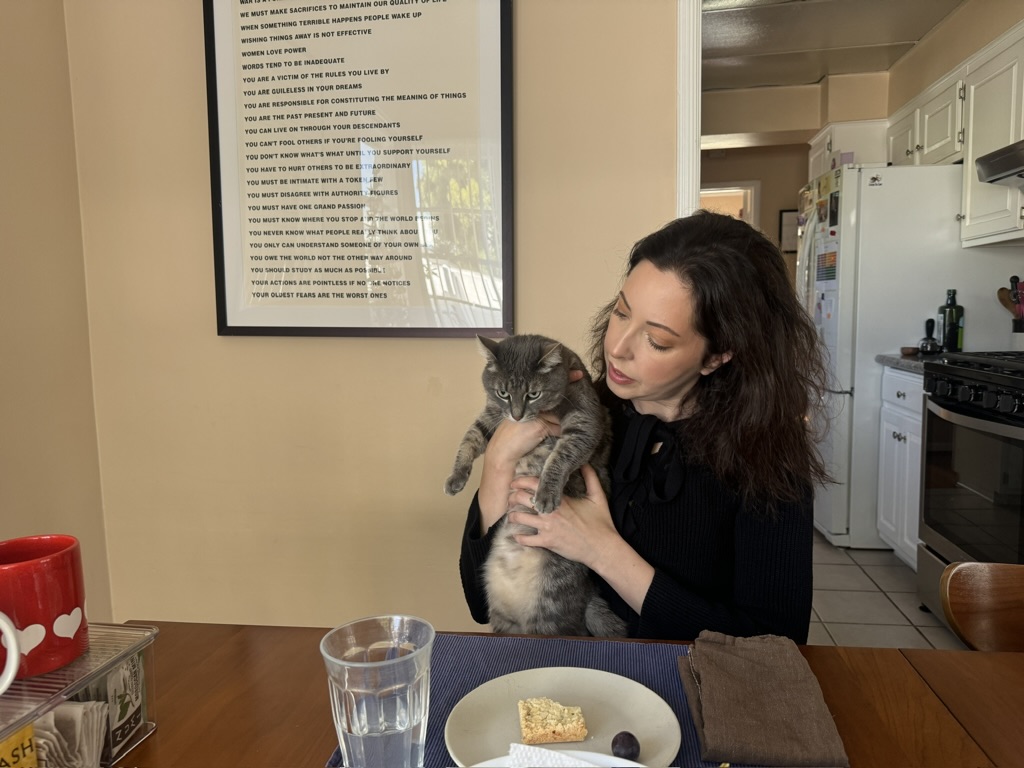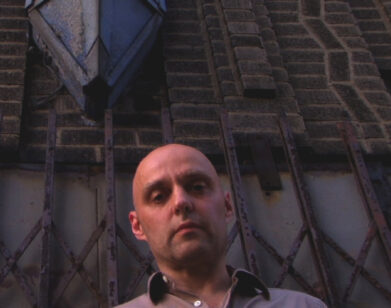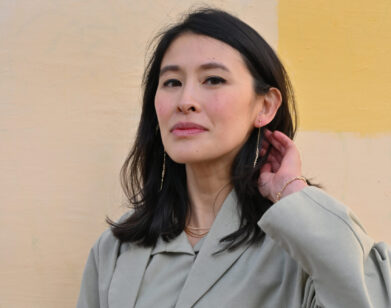LIT
Author Sarah Manguso on Men, Marriage, and Writing Out of Rage
There’s a note on my phone that contains 24 phrases cut and pasted from Sarah Manguso’s new novel, Liars. Some representative selections: “I grew up half crazy”; “Penetrative session”; “Slimy panties”; and “He’s the engine by which I learn what is left of my life.” I compiled it during the feverish day I gulped down the book, the story of a marriage told by the woman transformed into a wife within its grindhouse captivity. “I floated facedown in housewifery,” Jane observes of the decade-plus spent attempting to secure stability in a relationship with an unreliable, would-be artist. “I was exactly as angry as every other woman I knew.” The book’s language is taut and unflinching, captivating as a car accident, told with a confidence that is both funny and unnerving.
The precise descriptions for which Manguso is known have been sometimes mistaken for terseness or remove, a judgment slyly deconstructed by her 2022 novel Very Cold People, a book of observations, set in small-town, 1990s Massachusetts , that amount to a mountainous indictment of sexual violence. The insights therein, like those of Liars, demonstrate the damage wrought by the hierarchical systems of propriety and control that define the institutions of family and marriage.
One recent afternoon, Manguso welcomed me to her Santa Monica home. She served me fresh-baked rosemary shortbread and grapes and introduced me to her cat, Pebble. We talked about self-deception, domestic life, Goodreads, and what it really means to say that marriage is “work.”
———
LISA LOCASCIO NIGHTHAWK: Is there a question you really want to be asked that no one’s asked you?
SARAH MANGUSO: “How do you stay so sexy?” No, that’s not a question I want to be asked.
NIGHTHAWK: That’s a great question, though. How do you stay so sexy?
MANGUSO: I have tons of sex.
NIGHTHAWK: That’s a good answer, and actually a really good place to start. I don’t know if you know this about my book, but what I thought I was writing a book about was an experience that I really didn’t see represented in literature, which was a woman who wants to have sex and is being denied it. That’s not something that many people really remarked on in the critical treatment of my book, which is fine. But this is a really important and interesting part of Liars.
MANGUSO: She masturbates. It’s a lot.
NIGHTHAWK: I’m afraid to say this because I don’t know if this was your intention, but I found the use of the word “session” for sex to be so horrible. I think the reason I had that response is because it has all these connotations of the chore and the task; there’s a lot of scheduling language in the book. And early on, there’s a lot of scheduling conversations about money.
MANGUSO: God, yeah. Nobody’s noted this. I made a lot of people read this book before it went to anybody in the publishing profession. I wrote it much faster than I had ever written anything, and I wrote it in a state of mind that, up to then, was completely unique. It was the only book that I’ve written single, and I was also going through a high-conflict divorce at the same time. So, from the point of view of the narrator, she’s trying to contain the chaos of her husband’s lack of interest in the future. But from the perspective of me, the writer, I was trying to contain the chaos of my life. It was early COVID, I was suddenly divorced, I had an eight-year-old. Finances had always been chaotic, but now they were about to get really interesting. I hope I never write a book under those circumstances again because I was just completely fucking traumatized. So it’s interesting that you picked up on that desperate longing that Jane has to contain things and understand them and codify or control them.
NIGHTHAWK: It’s an extension of what she sees as her detestable housewifery. And I wouldn’t say that she’s forced into it. It’s more like she’s nudged into it.
MANGUSO: But that is coercion.
NIGHTHAWK: It is.
MANGUSO: And that is enforcement. Somebody has to do it.
NIGHTHAWK: Part of what makes the book really scary is that there’s several layers of reality. In the present layer of reality, she’s aware that she’s in this unbalanced and exploitative situation. But the book reveals two parallel realities that have been running at the same time; she’s living in one of them and he’s living in a different one. One of the really powerful things about the book, too, is that Jane and John’s child is also accorded his own reality.
MANGUSO: I’m really glad you saw that. It worried me to give so many pages to the child who was never named, but I thought, “Here we go, I’m a woman writing about a child. No matter how unsentimental it is, people will project sentimentality onto it.” I could have a whole separate conversation about writing about children, childhood, and all of the pitfalls that come along with choosing a topic like that. It just felt very important early on to recognize the essential humanity of my child. Parenting has just been one surprise after the next, as I’m sure you already know with your little one.
NIGHTHAWK: Yeah. The child, in many ways, is the moral heart of the book. And I actually think the book is judiciously fair to the husband, to John.
MANGUSO: Really?
NIGHTHAWK: Yeah. He digs his own grave, but it’s a very honest portrayal of her attempt to engage fairly with this person. And the expectation that it is possible to engage fairly, that things will go well for her if she tries to respect fairness, is not borne out.
MANGUSO: Yeah. Jane goes into this marriage thinking that it’s a partnership, and I think John goes into it wanting to think that he also wants a partnership, but he wanted a wife and he got a wife. I don’t know how overtly I let Jane express this, but she feels so ashamed that she just rejected all of her mother’s lessons about having your own bank, having your own money, keeping it separate. I think a lot of women in my generation were sold a bill as adolescents and young adults saying, “Feminism’s done now, you’re safe, you can even marry a man.”
NIGHTHAWK: There’s a moment later in the novel where Jane has this realization that all her life, she’s tried to be like a “man,” and she’s overlooked the valor of all of these women doing this brute labor of keeping people alive. I found that scene very moving. Are there other books that were really influential for this book? Maybe you were writing against them, too.
MANGUSO: I don’t mind confessing that the writing of this book wasn’t really an act of professional literature. To borrow a phrase from the great Amy Hempel, “This book was a place to put my rage.” That’s all it was. You can use the word “therapeutic,” I don’t give a fuck. It’s a novel. But no, I was not thinking about books when I wrote this book. If I were being deadly honest, I would say that rage has fueled most of what I’ve produced in my life.
NIGHTHAWK: I think that’s so great. Rage brings incredible clarity.
MANGUSO: I have felt it clearing away obfuscation. So, yes.
NIGHTHAWK: I want to be careful with how I say this, but there’s almost a sense that things would be easier for Jane if her sphere of influence was totally delimited to the home, which is not possible because John, the head of the household, is totally dysfunctional financially.
MANGUSO: I hate the word “empathy,” but it’s important for me in talking about the book to just feel a little bit sorry for John, who’s totally in over his head—not just as a husband, but as an adult.
NIGHTHAWK: As a human being, yeah. I don’t know that I felt sorry for him, but I felt sad about the whole thing basically.
MANGUSO: Part of the draw for him when he chose Jane is that she didn’t want to be a trad wife. Early on, it feels kind of like a status symbol for John that he has this artist wife.
NIGHTHAWK: I was genuinely surprised by the book.
MANGUSO: Oh, really? Wait, what surprised you, that John left?
NIGHTHAWK: I knew enough about the book to know that there would be a divorce. I thought she was going to leave, honestly.. I have this sense memory of all these realist novels that are great portraits of life with an edge. It’s like a type of realism that becomes almost absurd in the suffering that it portrays. I’m almost thinking about Milan Kundera, but that’s not a great comparison.
MANGUSO: I recently reread To the Lighthouse, and oh my god, it shocked me how much I failed to grasp when I read it in my 20s. This is about the impossibility of marriage. Mrs. Ramsay is this beauty who doesn’t care about her beauty, and Lily, she’s chosen to be lonely, but all the men are just fucking ridiculous. I had completely missed the appropriate condescension with which the men are described. I guess they would describe their lives as miserable, but they’re just making everybody around them miserable. There are a lot of human relationships that are characterized by abject misery.
NIGHTHAWK: It’s a compelling part of the book because there’s something about the clip at which the story flows, and your writing has this delicious gossip quality. A lot of it feels like these perfect details that you just couldn’t wait to text someone if you found this out about another person. The scene where John gets brought home drunk is so scary and traumatic and really carries through. He’s generally a mess, but he’s not always that much of a mess.
MANGUSO: It’s mostly in private that he’s fully a mess.
NIGHTHAWK: Another scene that just made me want to strangle him is the one where she’s with her student and he joins the lesson and starts talking about writing. At the same time, the main point of that scene is not to provoke empathy for John. I was just like, “The system screws us all.”
MANGUSO: I think most men born before about 1990 have been trained by the culture to think of themselves as people who teach other people stuff. The average man that you meet who’s 50, 60, 70 simply has no understanding of how to relate to a woman, unless it is to proffer wisdom. I was in a cab on my way to give a talk somewhere. I’m not an asshole, I’ll make conversation. But it was so shocking to me how quickly the conversation devolved into this man teaching me about a bunch of stuff that just popped into his head with no knowledge of what I know about a thing. He just sort of started lecturing me on various topics. Anyway, I turned on my phone and I recorded about 20 minutes of it. But yes, you’re right. We’re fucked. But I think there’s something going on with Gen Z men, because they grew up in a less misogynistic cultural soup. It’s been a gradual evolution.
NIGHTHAWK: I recently had the exact same experience with a cab driver.
MANGUSO: I’m sure you did.
NIGHTHAWK: But the deeper cut that comes up for me in talking about this is the emotional affair I had with an older writer, which was sordid and gross and largely took place over text. The thing that I remember that I took great affront to was him telling me to contribute to my retirement account. I was like, “I can’t contribute to my retirement account. I’m an adjunct. I have no money.” You’re a homeowner with children and I’m a woman in a bad place and who is significantly younger than you. I’m sure he thought he was being helpful in telling me that he’d been contributing the full amount to his IRA since he was 23.
MANGUSO: He wanted to feel like he was helping you, but he didn’t want to actually help you. To actually help you, he would’ve given you money.
NIGHTHAWK: Oh, yeah. That would never going to happen.
MANGUSO: I freely confess that I’ve looked at the Goodreads page for this book, which is not something I’ve done for my other books, but my editor told me to look at it because people have had emotional reactions to Liars. And it has really struck me that so many people, almost in lieu of reviewing the book, are just reviewing how much they hate John. I’ve definitely done some thinking about that.
NIGHTHAWK: God save me, I cannot stop looking at my Goodreads page because it’s like, the only place there’s any action anymore, right?
MANGUSO: Oh god, yeah. But I guess what I’m saying is, I am shocked by how meaningful and useful it’s been to read. These aren’t professional readers, editors, critics. The big message of Liars is that obviously, John’s a liar. He’s a cheater and an addict and a terrible guy. But the big realization that Jane has is that she’s by far the greater liar. She’s been lying to everybody she knows and to herself that this marriage is okay. And I think what people seem to be reacting to is, “Holy shit, we thought we were so advanced in feminism that we weren’t still protecting such a patriarchal system as contemporary marriage.” It’s been so incredibly affirming to hear from women readers who had the same experience that I did when I was almost 50 and realized, “Holy shit, this wasn’t a partnership. I was in a fucking heteronormative marriage and I should have known.”
NIGHTHAWK: That’s such a beautiful, loud, and clear message of the book. It’s a very unafraid, direct book.
MANGUSO: It’s kind of you to say that.
NIGHTHAWK: It’s incredibly empowering, and I would argue healing, because of its directness. There’s a tendency to try to always look for the remedial narrative, but the only thing that is remedial in this narrative is the reality of time. And the book ends in a really beautiful place. It’s freedom, it’s also release. The marriage has finally ended.
MANGUSO: And by the end of the book, her divorce is no longer the main thing about her. Whereas, over that first year, it was the main thing. It was the top card in the deck, and that’s definitely how I felt after my divorce. I was a divorced, single mom, and that was all that I felt like for so long. But then suddenly, it just ebbed on its own. I barely think about myself as divorced anymore, which is amazing because it also draws my attention to the fact that I thought of myself as married for so long.
NIGHTHAWK: I have a question from the world of oral history, which is: if you were to explain what you wish everyone who read your work understood about it, or what was crucial to know about you to understand your work, what would that be?
MANGUSO: Oh gosh, that’s an amazing question. I guess I’ll vamp a bit and say, I obviously don’t know what anybody’s thinking when they’re reading my bookS, because the act of reading is private and it doesn’t take place in my world. It takes place in a reader’s world. But you know what would make me really happy? If all critics could come to read and critique a woman’s art as such, and not make the critique about what they think a woman should have written. Every woman writer who’s published anything at all has faced the experience of a man reviewing her work, but really sort of reviewing his own ideas. There was a take-down of one of my books that really just turned into a take-down of what the critic thought about my personality from how I appear on the internet. I would just say, I wish that my work could be evaluated as such, and not taken as an offshoot of what you think my personality is based on a few interviews that you’ve read. Oh, well.
NIGHTHAWK: That’s great. Is there anything else you want to talk about?
MANGUSO: Well, we haven’t centralized men in this conversation, which has made me really happy. We talked about addiction, we talked about divorce. We’ve used the word “abuse” a few times. I guess one last thing that might be relevant to the conversation is that marriage takes work, right? It was just so shockingly easy for me as a wife to think, “Oh, this is just the work. This is the hard part of marriage that I’ve been hearing. This has been represented as something that should be really hard.” But what was so important to me in writing this book was to get really granular about exactly what was happening. I wanted every single scene to be full of details so that a reader could look at it and say, “Oh, it’s work, but that’s abuse.” And not to go back to Goodreads again, but—
NIGHTHAWK: We can always go back to Goodreads.
MANGUSO: It’s been so amazing to see readers say, “This is abuse. This reminds me of something that happened in real life that I know was abuse.” It’s just been really gratifying to see people read the details and react to them in exactly that way. NIGHTHAWK: Absolutely. I think you’re very successful in that. But the book is very funny despite all of the sorrow.
MANGUSO: Bless you.







